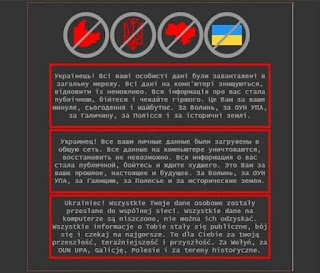Cyber Security in Ukraine: Mitnick's formula
We have already discussed the IT special in our countries, now it is a
turn to talk about security in this field. Before I started the overview, I may
say that nowadays situation in Ukraine is urging security specialists to work
in a more effective and time-efficient way. This is all due to numerous cyber
attacks on government resources, conducted by Russian hackers, so now it is the
best way to flourish for Ukrainian Cyber Security specialists. There is a
saying: “what doesn't kill me, makes me stronger” which is very suitable here.
Nobody can’t be killed by a cyber attack, so there is the only way to get out
of this situation, to progress at a lightning-fast pace. This is happening now
with the help of EU specialists (including those guys, who have developed and
maintained Estonia’s digital security system). I will display the information
using Mitnick’s formula: technology, training, and policy.
Technologies…I’m not very competent with particular examples, but I think nearly all resources have decent firewalls and networks. I used to notice it when accessing websites from outside of Ukraine, for example, my current residence – Estonia. There is nearly always a captcha at least, to somehow protect from abundant requests. This is only what users see. There is some discussion around the government project “Diia”, which is a mobile app, a web portal, and a brand of e-governance in Ukraine. Launched in 2020, the Diia app allows Ukrainian citizens to use digital documents on their smartphones instead of physical ones for identification and sharing purposes. The Diia portal allows access to over 50 governmental services. In the future, the government plans to make all kinds of state-person interactions available through Diia. [1] I think Diia is the most sensitive project in my country due to the storage of millions of items of personal data such as passports, driver’s licenses, and other kinds of staff, so it was targeted several times.
With recent scam attacks on collecting sensitive data, I think way more people tend to behave more carefully with anonymous or not strange messages to emails and private messages. Since the 24th of February, there have been hundreds of such examples. The most recent one is yesterday’s private message with the appeal to tell “your” story of this war because the world should know the truth.
The level of awareness has its peak now, due to some I may call
“training” by the government, which are some rules on how to behave with
suspicious messages. Even before the war, the level was pretty good. The youth
was conscious, as well as “boomers”. We are trying to do our best as well to
succeed in teaching our grandparents, so overall I’m somehow even proud.
Regarding security policies, there are three basic principles of state
policy which is also related to the IT sphere:
• Deterrence – development of security and defense capabilities to deter armed aggression against Ukraine;
• Resilience – the ability of
society and the state to quickly adapt to changes in the security environment
and maintain a sustainable operation, in particular by minimizing external and
internal vulnerabilities;
• Interaction – the development of strategic relations with key foreign
partners, primarily with the European Union and NATO and their member states,
the United States; and of pragmatic cooperation with other states and
international organizations based on the national interests of Ukraine.
The Cybersecurity Strategy is aiming in particular to improve the
security of network and information systems, introduce a risk management
system, create conditions to provide resources including human cybersecurity,
enhance operational and cybersecurity critical infrastructure, fight against
cybercrime, use the capabilities of public-private partnership, and interaction
of stakeholders to address cybersecurity and cyber defense issues and
increasing the level of online culture. One more issue is that we do not have a
cookies policy, but I don’t think it may dramatically change the situation.
To sum up, definitely, Ukraine’s Cyber Security has some minor problems, but it is developing fast using up-to-date security strategies with the help of our EU friends.
References :
1.
https://en.wikipedia.org/wiki/Diia;



Коментарі
Дописати коментар